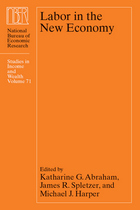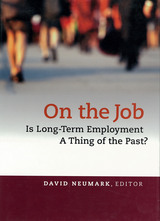
How can workers retain job security in an industry currently experiencing extensive restructuring and retrenchment? In the United States, massive layoffs in the 1980s in industries like steel have resulted in increased worker demands for job security provisions in collective agreements and legal protections against layoffs. In many Western European countries, where private-sector practices ensuring strong job security and laws regulating layoff practices were well established, the 1980s brought strong pressure from business to relax job security in order to facilitate rapid restructuring.
Susan Houseman's book presents some of the first hard evidence on the economic effects of providing job security, evidence gathered during the restructuring of the European Community's steel industry in the 1970s and 1980s. The author reviews personnel practices by the Community's leading steel companies, basing her analysis on extensive interviews with employers, workers, and government officials in West Germany, France, Britain, Belgium, Luxembourg, Italy, and the Netherlands. Drawing on economic theory, she shows that the extent of workers' rights to job security will affect how an industry optimally adjusts to a decline in demand and to a situation of excess capacity.
Using detailed plant data, she shows that job security for workers affected decisions concerning employment, production, investment, and plant closures in the industry, While job security for workers may slow the process of industrial restructuring and result in lower productivity, the author points out that it also generates important social benefits, including community stability and a more equitable distribution of the risks and costs of economic change.
This book will draw the attention of policymakers in government and in international organizations such as the European Community, the OECD, and the ILO. It will also be of interest to scholars in labor economics, industrial relations, public policy, and business.

As the structure of the economy has changed over the past few decades, researchers and policy makers have been increasingly concerned with how these changes affect workers. In this book, leading economists examine a variety of important trends in the new economy, including inequality of earnings and other forms of compensation, job security, employer reliance on temporary and contract workers, hours of work, and workplace safety and health.
In order to better understand these vital issues, scholars must be able to accurately measure labor market activity. Thus, Labor in the New Economy also addresses a host of measurement issues: from the treatment of outliers, imputation methods, and weighting in the context of specific surveys to evaluating the strengths and weaknesses of data from different sources. At a time when employment is a central concern for individuals, businesses, and the government, this volume provides important insight into the recent past and will be a useful tool for researchers in the future.


Many workers today feel that the longstanding social contract between government, business, and labor has been broken. This book examines legal and philosophical problems that must be addressed if there is to be a new social contract that is fair to workers. Drawing on a wide variety of sources, from the popular press to technical philosophy, Edmund F. Byrne brings into focus ethical issues involved in corporate decisions to reorganize, relocate, or automate. In assessing the human costs of these decisions, he shows why, to a worker, "corporations are not reducible to their assets and liabilities any more than a government is merely its annual budget. That they are organizations, that these organizations do things, and that they are socially responsible for what they do."
In support of this assignment of responsibility, Byrne seeks to demythologize corporate hegemony by confronting a variety of intellectual "dragons" that guard the gates of the status quo. These include legal assumptions about corporate personhood and commodification, private property and eminent domain; management ideas about the autonomous employee and profit without payrolls; technocratic dreams of a dehumanized workplace: ideological belief in progress and competition; and philosophical arguments for libertarian freedom, liberal welfare, and global justice.
Because of these and other mainstream perspectives, workers today are widely perceived, in law and in common parlance, to be isolated atoms. But, Byrne emphasizes, work. including work done for a transnational corporation, is done in a community. Since corporate leaders make decisions that have an impact on people’s lives and on communities, involvement in such decisions must be not only corporate or governmental but community-based as well.
READERS
Browse our collection.
PUBLISHERS
See BiblioVault's publisher services.
STUDENT SERVICES
Files for college accessibility offices.
UChicago Accessibility Resources
home | accessibility | search | about | contact us
BiblioVault ® 2001 - 2024
The University of Chicago Press









